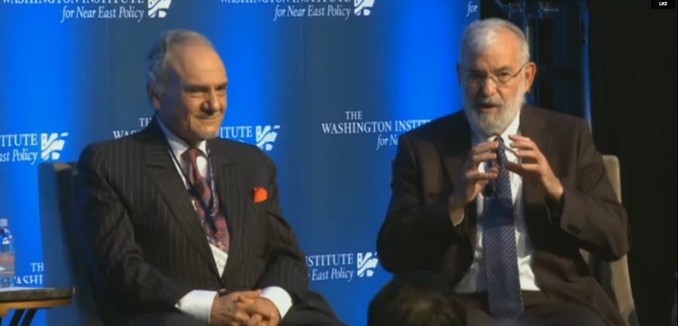In assessing Wednesday’s meeting between President Donald Trump and Israeli Prime Minister Benjamin Netanyahu, Israel’s former national security advisor said that wider and more open rapprochement between the Jewish state and its Arab neighbors was a “realistic” prospect, even if not a guarantee.
Speaking with reporters on Thursday, Gen. (res.) Yaakov Amidror recalled that he appeared last year in a public forum with Saudi Arabia’s Prince Turki, who served as the kingdom’s former intelligence chief, as well as ambassador to the Washington and London. At the time, Turki said that the Saudis were not ashamed of the contact with an Israeli and were looking for avenues to cooperate with the Jewish state.
“It’s a huge opportunity which we didn’t have in the past, and today it is there,” Amidror observed. “Unlike in the past, in which it seemed like Israel needs it because Israel needs the Arab states, on this occasion it’s not just Israel. It’s the Arab states who need Israel as well.” He added that shared Arab and Israeli interests “should be used by both the new administration and the state of Israel and those Sunni Arab states to build something which will work for the benefit of all.”
Amidror acknowledged that building such an alliance will not be easy because Arab nations have become “the prisoner of their own propaganda” and cannot easily work with Israel while their publics are invested in the Palestinian cause. However, if an Arab “umbrella” were to be formed under American auspices that included Israel, Amidror contended that growing instances of security cooperation could lead to an “evolution” in the Arab countries. “As I said it’s very complicated, but if the Americans will be determined … it can be done,” he said.
Amidror’s description of an “umbrella” of Arab nations led by the U.S. sounds similar to a recently reported effort by Washington to build an Arab alliance to counter Iran and ISIS.
Regarding Wednesday’s meeting between President Donald Trump and Israeli Prime Minister Benjamin Netanyahu, Amidror said that “the atmosphere and the personnel relations were very good,” and noted that both leaders agreed “about the need to contain Iran.” He added that the Trump administration did not yet seem to have a “clear vision” of how to approach Israeli-Palestinian relations, but that it appeared to be willing to accept Israeli input in formulating its approach.
Amidror added that other than Iran, “the most important” issue Trump and Netanyahu discussed is “how to build the new Middle East after the shake up of the Arab Spring.” This challenge is magnified by the collapse of several Middle Eastern nations, as well as “the intervention of the Russians” and Iran’s efforts “to build an axis going from Tehran through Baghdad into Damascus and Beirut,” he said. This begs the question as to whether a stable regional alliance can built to content with “armed radical Islam from Muslim Brotherhood to ISIS in one side, and to contain Iran on the other side.”
While Amidror cautioned that efforts to establish a new arrangement in the Middle East will be long and complicated, he noted that the good atmosphere and personal relations between the American and Israeli administrations bode well for cooperation in this area.
A recording of Amidror’s call with reporters is embedded below.
[Photo: Washington Institute for Near East Policy ]




